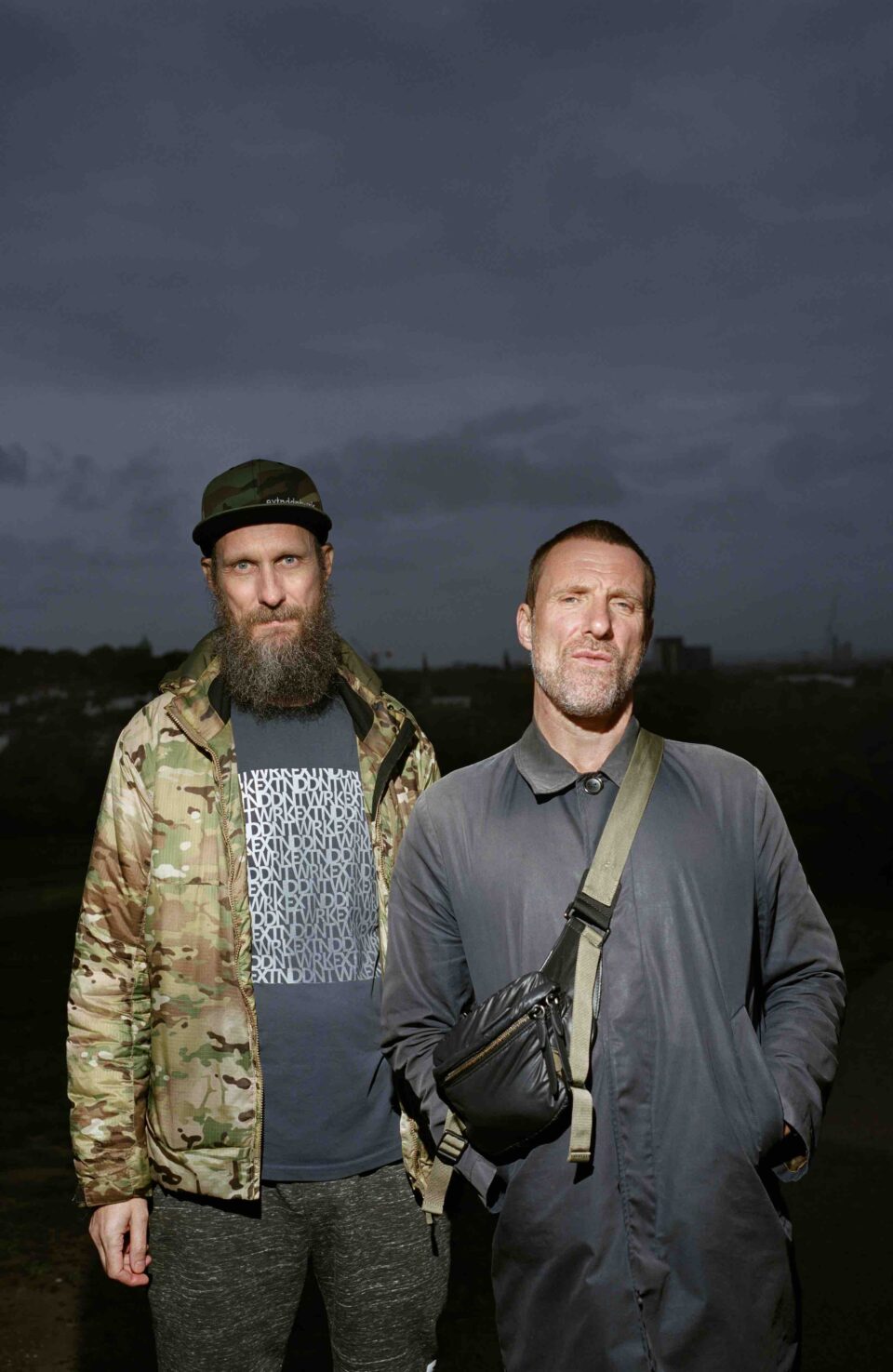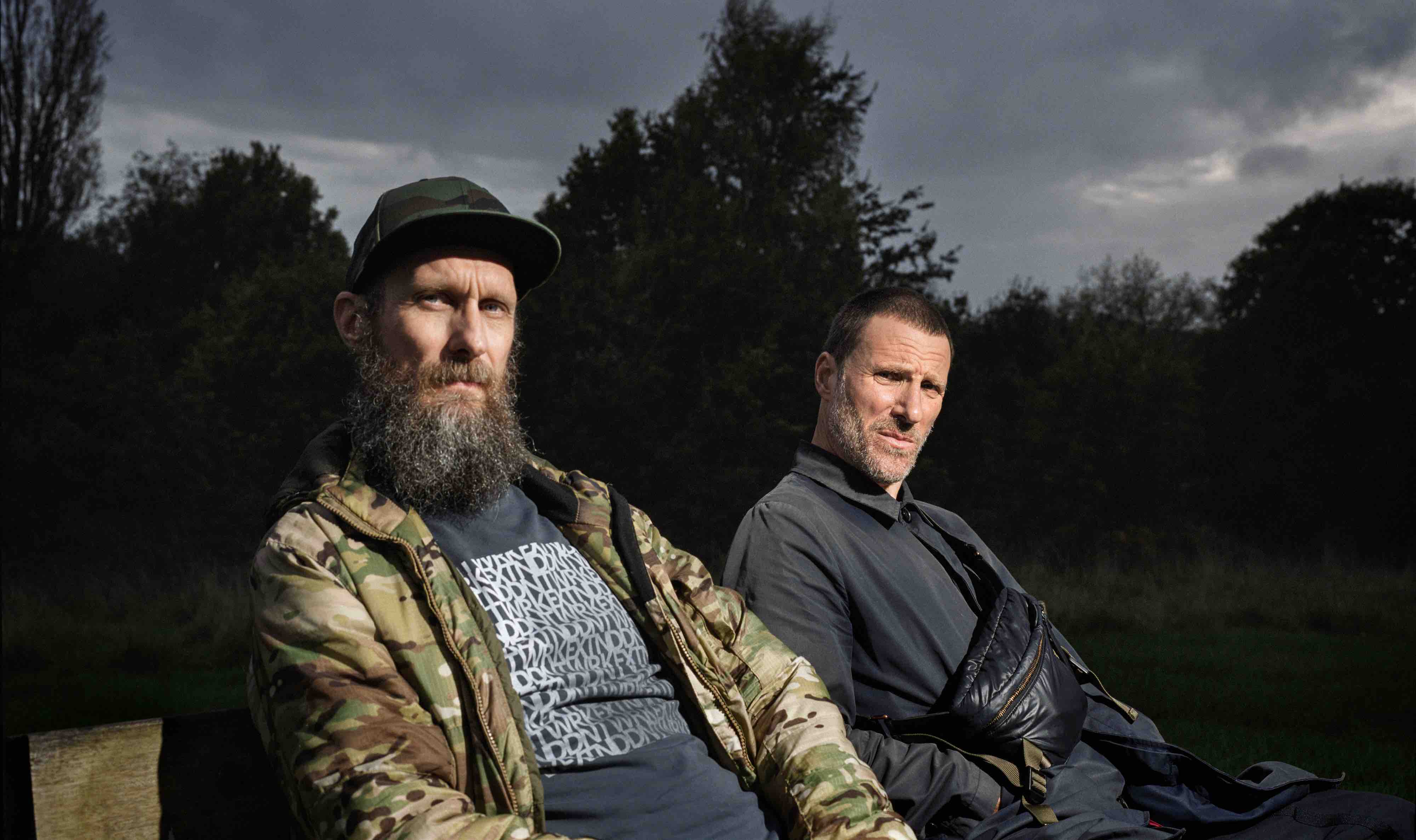Everywhere you look these days, someone’s lamenting the world’s devolving conditions. But English duo Sleaford Mods do it with a rare and unmistakable authenticity—and in a way that’ll make you dance. Clearly, they’ve spent time in society’s darkest corners, and they’re going to guarantee you’re aware of the injustice, poverty, hypocrisy, and greed lurking there, too.
Vocalist/lyricist Jason Williamson isn’t just pointing fingers: he’s equally likely to implicate himself as a culprit in the current sorry state of things. His thought-provoking and often brutal observations gain even more intensity from his bandmate Andrew Fearn’s pulsating post-punk and skittering electronic instrumentals. It’s a compelling, sometimes abrasive mix that brought Sleaford Mods immediate acclaim when Williamson released 2007’s self-titled debut album as a solo endeavor.
Age isn’t mellowing them, either: the band is gearing up to release their twelfth album, UK Grim, which continues their compelling truth-telling crusade, with a lengthy tour of Europe and North America to follow. Calling from his Nottingham, England home, Williamson reveals how challenging times—and challenging the status quo—have led to the duo’s success.
What’s the meaning behind the title “UK Grim”?
We’d been using #UKGrim as a hashtag for the promotion of Spare Ribs, our last album. It was a term to describe the music that we made, which was a spinoff of “UK Grime”—we just took the “E” off the end. Whatever [music] Andrew brings to me, the moods can create loads of different pathways for inspiration. [This time,] Andrew sent the music and I had lyrics that just suited it straight away. I know “dystopian” is a term that’s used quite a lot now, but it really did appear to me to be quite bleak; you got this feeling from it when you heard the music. His music is so varied, and it contains so many influences. It’s like a packet of spaghetti and each strand is like a genre of music. Then I just add my bit to it, and it creates this kind of hybrid effect of all these musical styles, but they all seem to work together.
“People who really see what the world truly is are those without money, I think. The curtain is drawn back and you get to see the internal working of this capitalist overthrow that we live under.”
When you were starting out as a lyricist and vocalist, how did you know you wanted to talk about sociopolitical issues instead of just, say, writing love songs?
I tried writing love songs and introspective, whimsical songs—really complacent observations about things. That was big in the ’90s. Noel Gallagher was massive with that kind of thing. So I tried all that. I didn’t get anywhere with it. At the same time, my life was going downhill—substance and alcohol abuse, and I was completely being reckless. I was quite depressed and not happy with life. Then I started to see the world for what it was, because I didn’t have any money. People who really see what the world truly is are those without money, I think. The curtain is drawn back and you get to see the internal working of this capitalist overthrow that we live under. That’s when I started talking about stuff like that, because it suddenly occurred to me that this is all that mattered: the struggle and the daily scenarios you got yourself into…and to be conscious of the fact that you’re just as much of a fucking idiot as everybody else.
It doesn’t seem like everyone is inclined to look at their own flaws like that, though.
No, clearly not. Probably people think that they do, but I always find that people only go so far with it. Perhaps I’m not prepared to go the whole way with it sometimes. It’s been a learning curve for me over the last few years, definitely, to go further into why I do things. It’s an interesting notion.

391310180002.tif
“I went from wanting to be famous to falling in love with the process of creating music, of creating something that was powerful and original.”
What do you think it is about your work that’s made it resonate with listeners?
We really do strive to write decent songs, and I think that resonates, perhaps more than the idea that we’re political or that we’re this working class band. I think they’re just good songs, and it’s songwriting that’s really honest and quite minimal. There’s a lot to be said about minimalism, I think. It’s just not in a lot of music. It’s quite hard to do, in a lot of respects, and I think we do it well. And the fact that we’re older, because there’s a lot of older people in the world. Perhaps it’s a nice, refreshing thought to think that people can still get on in life.
When you play outside the UK, do you ever feel like some of the things you sing about are lost in translation because you often talk specifically about the English experience?
I would imagine a lot of the time people don’t know exactly what I’m going on about, but they can relate to the energy of the music. They can relate to the rhythm of the vocal, perhaps. I would imagine it’s the same as me listening to Wu-Tang Clan: I don’t exactly get the localisms, I don’t exactly get the slang that they use, but I completely connect to the music and the rhythm of what they’re doing.
“I would imagine it’s the same as me listening to Wu-Tang Clan: I don’t exactly get the localisms, but I completely connect to the music and the rhythm of what they’re doing.”
Florence Shaw of Dry Cleaning and Perry Farrell make striking guest appearances on UK Grim. How did that come about?
Perry Farrell got in touch with us and asked us if we wanted to collaborate with him for a song, and we said yes straight away. We’re not extensive Jane’s Addiction fans, but he’s a really interesting person, he always has been. And Florence Shaw—[we’re] big fans of Dry Cleaning, have been pretty much since their first album came out. When they supported us in 2021 for the Spare Ribs tour, I always thought it would be good to get her on a song. When Andrew sent me the music for “Force 10 From Navarone,” I just knew it would work with her.
What made you want to become a musician in the first place?
I loved the music of the Sex Pistols, The Jam and Paul Weller, Motown, and hip-hop. I just wanted to emulate some of that. It occurred to me very early on that I could sing and write rough songs quite well, and it just went from there, really. I slowly started to master the understanding of production, of songwriting, of the idea of progression and originality. I went from wanting to be famous to falling in love with the process of creating music, of creating something that was powerful and original, and I believed that that was the thing that was going to set me apart. It took a long time, 20-odd years, but I got there in the end. FL









